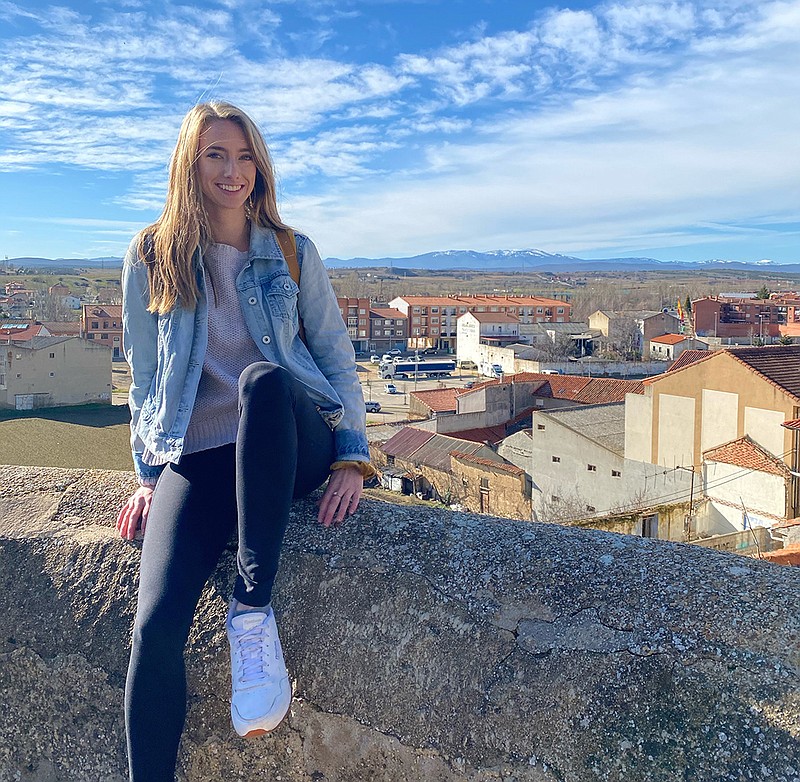For one Texarkana college student studying overseas in Spain, the coronavirus outbreak started a middle-of-the-night scramble to get home to the U.S.
And when Halah Nelson returned, she found herself placed in a two-week quarantine at the University of Central Arkansas, where she's a junior majoring in Spanish and psychology. She'd studied in Spain on a semester exchange program with a handful of other UCA students.
With about a week to go in quarantine, she misses seeing friends and family. She's staying in campus housing with other students who were abroad.
Nelson, the daughter of Russ and Holly Nelson of Texarkana, Arkansas, began a study abroad program in Leon, Spain, at the start of the year. Leon is a city of roughly 200,000 people, and COVID-19 has hit Spain hard with more than 17,000 cases and 800 deaths as of Thursday.
When Spain's virus level jumped to a Level 3 alert overnight, that was it. "Thursday morning at 3 a.m. my roommate came in telling me about the travel ban," Nelson recalled earlier this week.
They didn't know exactly what that meant for them, other than get the first train to Madrid and fly home. They even had a grammar test that morning and goodbyes to give. "We're all frantically calling our parents trying to book flights," Nelson said.
"Luckily for me, my mom had the brilliant idea to go to the airport in Texarkana because no one could get through to American Airlines, because they were so flooded with calls," she said.
They packed up, had a final dinner at the McDonald's near the train station and headed to the airport. Nelson and another student watched the bags of the students who had the first flights back so they could catch some sleep. "So me and him we were actually in the Madrid airport for 12 hours that day, just for our friends," she said.
Students were finishing the first of two trimesters in Spain when they had to leave, Nelson said. They heard about the virus fairly early. "Obviously, there was the growing fear of everything going on. There were obviously lots of cases in Spain, even several cases in the city where I was living," she said.
Studying at a language school, they met students from all over, including Chinese students teaching and studying Spanish. This gave her a closer view of the coronavirus problems brewing in China, an understanding of just how serious this was.
"We had a lot of students who were very worried for their families back home," Nelson said. "Because they had more first-hand experience watching their parents be told to stay inside." The news was tangible early on.
"It wasn't just a distant thing," Nelson recalled, noting eventually the UCA students realized they'd be called back home. They watched what happened in Italy, the nation hit the second hardest so far.
By the time the U.S. president issued a travel ban, the virus was spreading rapidly in Spain, jumping from 3,000 to 5,000 in just days, Nelson said. They thought they'd make it to the final exams on Monday, but that was not to be.
"I loved my time there. I loved Spain," Nelson said, noting Leon is a small, compact city where you can walk everywhere. "Kind of like how we would imagine a bit city in the U.S. except there's not that many people living there." It would take 45 minutes to walk across Leon, she said.
"It was an incredible experience. I made great friends. I was teaching English to these three young girls so I had to say goodbye to them and their family," Nelson said. She'd play with the kids and speak English for them. She was sad to leave. "It was fun and I got to know them and got to know the parents."
When Nelson made it to Dallas, she endured a three-and-a-half hour line at U.S. Customs, but she points out that was comparatively shorter than what others had. People tried to do their best.
"For the most part everybody was in a fairly good mood," Nelson said. "There were only a few people that made me embarrassed to be an American."
They made the most of it. Many travelers were students. One pulled out a pack of cards. "We were playing Go Fish on my luggage," she said.
Nelson hasn't been tested for the coronavirus, but she hasn't shown any symptoms and UCA is closely monitoring her health. She had the option of returning home, but with family members who could potentially get sick she opted for quarantine at UCA. He dad works at a hospital and sees patients every day.
"There was no way I was willing to risk going home. As much as I want to see my friends and family, it wasn't worth it," Nelson said, "to be quarantined at home."
UCA has accommodated their needs, she said, providing her and three others with hot meals and anything they need. "They've really taken care of us," Nelson said, noting her sister lives nearby and delivered crafts, chocolate and On the Border food. From a distance, they could say hello.
"That's the most contact I've had," Nelson said, noting all of them in quarantine feel healthy.
"It's definitely scary. The thing that worries me most is the people who are still going out, hanging out with their friends, going to bars. That kind of stuff. Throwing parties. That's worrisome. I think having been abroad, having been in Spain when it escalated so quickly, I was able to see how we went from two weeks ago when we had 20 cases, and then we had 3,000 and we had 5,000," Nelson said.
People don't realize how quickly it escalates.
"Yes, this is a scary time," Nelson said, "but I think the scariest thing is people taking it lightly."

